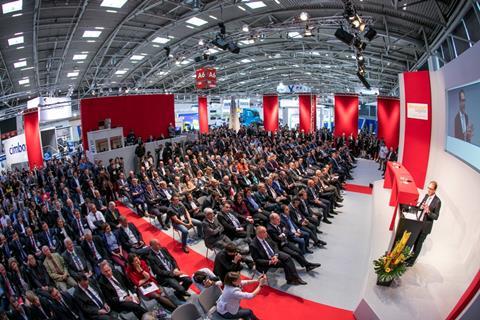
Air Cargo Europe, held every two years in Munich, will focus on all things digital.
Artificial intelligence (AI) is entering the air cargo supply chain, with shipments finding their own way via the Internet of Things. How should the air cargo industry address this changing logistics landscape?
These will be the key themes under discussion at the Air Cargo Europe conference and exhibition, taking place on June 4 to 7 at the Messe München.
The Air Cargo Europe conference and exhibition will be held in Hall B1 and part of Hall B2, in tandem with the largest multimodal trade fair in Europe, Transport Logistic, which will be spread over 10 massive halls.
The two morning air cargo conference sessions will both take place in Hall B2, Forum II (West).
The first session on June 5 will discuss Artificial Intelligence: Next Level Air Cargo? The topic for the second, on June 6, will be Robotics and Automation – Next Level Cargo Handling?
“We are thrilled that we have managed to attract even more important players in the air cargo industry, such as Neutral Air Partner, WCA, Finnair Cargo, Antonov Airlines, Thai Airways and All Nippon Airways, to the trade fair,” said Stefan Rummel, managing director of Messe München.
The AI effect
AI is having a big impact on air cargo, explained Prof. Dr. Joachim Ehrenthal from the University of Applied Sciences and Arts Northwestern Switzerland.
“The use of AI is the logical consequence of progressive digitalisation in the air cargo industry,” said Ehrenthal, who will be a contributor for the open discussion on AI.
Through the “exchange of views and information on specific applications”, Ehrenthal intends to bring the topic of AI “down to earth”.
AI is already deployed throughout the air cargo chain for projections, optical process monitoring, vehicle maintenance, the packing of containers and fraud detection.
Dr Harald Sieke, head of the aviation logistics department of the Fraunhofer Institute for Material Flow and Logistics (IML), believes it will extend further, saying: “AI will be deployed throughout the entire air cargo transport chain.
“The most promising opportunities relate to bookings, reservations and cargo organisation for plane loading. AI will also cause market shifts as some players will reposition themselves and others will leave the market altogether.”
Smaller shipment growth
Another trend is that the strong growth of e-commerce has led to smaller shipments being sent.
“This focus on smaller units will increase primarily in international e-commerce, which is a very important segment for the air cargo industry,” predicted Sieke.
Customers also want to be able to track shipments seamlessly from end to end. Cargo iQ, an IATA initiative, is designed to contribute to process control, quality control and service improvement.
Nabil Sultan, divisional senior vice-president cargo at iQ-certified Emirates SkyCargo, said: “We proactively interact with our customers regarding the shipping status.
“We monitor shipments around the clock in real time using established milestones, and implement corrective measures in the event of deviations or delays.”
The shortage of skilled professionals is also accelerating the trend for automated cargo handling and transportation systems.
At the same time, “up to 5% of air cargo will no longer be needed on account of 3D and 4D printing”, estimated Sieke.
However, if you compare this figure with expected annual growth in air cargo, then “the effects of these types of technology should be seen as negligible”.
The Internet of Things will have a much greater impact, added Sieke: “In the future, shipments will find their own way through the air cargo network,” said the scientist.
“In five to 10 years, current intensive research on this will be tangibly felt in practice.”
The air cargo industry is already making a multi-faceted contribution to climate protection, from the electrification of ground traffic through to solar installations for buildings.
The sustainability of aircraft as a means of transport needs to be improved as a whole and the European Clean Sky Joint Technology Initiative is striving to achieve this goal.
One area with promising potential is power-to-liquid technology, which involves a process for generating carbon-neutral synthetic liquid fuels.
The same can be said of hybrid- electric flying. Norway has set a target for 100% of domestic flights to be made using zero-emission planes by 2040. All-electric cargo planes, however, are still a long way off.










